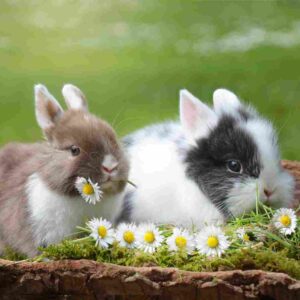Good Rabbits' Benefits
For excellent reasons, rabbits are popular pets. They are intelligent social, and fun. Rabbits could enhance your life.
Rabbits are low-maintenance pets. They need little space and may be maintained with regular brushing, nail clipping, and nourishment monitoring. Rabbits are quiet and won't bother your neighbors or house.
Rabbits are clever and friendly. They can learn names and basic skills. Rabbits interact with their owners too. This makes them wonderful friends and companions.
Rabbits are inexpensive. They need less food and trips to the veterinarian than other pets. They're fantastic for budget shoppers.
Finally, bunnies help kids understand responsibility. They need frequent care, which can teach kids about pet care. This demonstrates kids' responsibility and empathy.
Rabbit ownership has several benefits. They are smart, outgoing, and low-maintenance. They're cheap and teach kids responsibility. Rabbits are delightful pets.
Selecting the Right Rabbit Breed
Selecting a rabbit breed is challenging. Consider your lifestyle and requirements before choosing a breed from the numerous available. Here are some rabbit breed selection recommendations.
Start with lifestyle. Do you want a companion or a show rabbit? The Netherland Dwarf and Mini Lop are amiable and social breeds that make good companions. Consider Dutch or English Angora show rabbits for their superb conformation.
Second, consider your home. The Netherland Dwarf or Mini Lop are good choices for compact apartments. Consider the Flemish Giant or French Lop if you have more room.
Third, budget. Depending on the breed, rabbits may cost hundreds to thousands of dollars. The Netherland Dwarf or Mini Lop are cheaper breeds. Consider the Flemish Giant or French Lop if you have more money.
Finally, consider experience. The Netherland Dwarf or Mini Lop are good first-time rabbit breeds. If you have rabbit expertise, try a more difficult breed like the Flemish Giant or French Lop.
When picking a rabbit breed, consider your lifestyle, living space, money, and expertise level. With the correct breed, you may spend years with your new pet.
Healthiest Rabbit Diet
Rabbits must eat properly to be healthy. Herbivorous rabbits should only eat plants. Hay, fresh veggies, and a few pellets make a nutritious rabbit diet.
Hay, a good source of fiber and digestive health, should make up most of a rabbit's diet. Rabbits prefer high-fiber, low-protein, and calcium-free timothy hay. Rabbits must always have hay to keep their teeth worn down and avoid overgrowth.
Rabbits need fresh veggies. Kale, spinach, and romaine are good choices. Carrots, celery, and bell peppers may also be served moderately. Introduce new veggies gradually to avoid gastric distress.
Finally, give rabbits a few pellets. Pellets are nutrient-dense and should be fed sparingly. Because some pellets include too much protein or calcium, rabbit pellets are best.
Follow these suggestions to provide your rabbit with a balanced diet. Hay, fresh veggies, and a few pellets can keep your rabbit happy and healthy for years.
Healthy and Happy Rabbit Tips
1. Give rabbits a secure and happy home. Make sure your rabbit's cage has adequate room for toys and activities. Comfort your rabbit with a litter box and bedding.
2. Balanced diet: Your rabbit needs a balanced diet. Feed your rabbit hay, fresh veggies, and a little pellets. Treats may make rabbits fat.
3. activity: Healthy rabbits require plenty of activity. Toys and activities keep rabbits occupied. Give your rabbit a spacious, contained space to play.
4. Spend time with your rabbit: Rabbits are gregarious creatures and require attention. Play with your bunny daily.
5. See the vet regularly: Rabbits need frequent vet checkups. Check and vaccinate your rabbit regularly.
These techniques might help keep your rabbit happy and healthy.

Preventing Common Rabbit Health Issues
Popular pets rabbits might have health issues. Awareness and prevention are crucial.
Dental disease in rabbits is prevalent. If rabbits don't chew, their teeth might grow too long and hurt. To avoid this, give your rabbit lots of hay and chewable objects like wood blocks and cardboard.
Gastrointestinal stasis—a digestive system slowdown—is another typical concern. Stress, a low-fiber diet, and inactivity may trigger this. To avoid this, give your rabbit a high-fiber diet like hay and plenty of activity.
Ear mites, small parasites that dwell in rabbit ears, may cause discomfort and illness. To avoid this, frequently check your rabbit's ears for mites and wipe them with a cotton swab and a moderate vinegar and water solution.
Finally, rabbits may get respiratory infections from stress, inadequate ventilation, and low-fiber diets. To avoid this, give your rabbit a stress-free environment, proper ventilation, and a high-fiber diet.
These methods may keep your rabbit healthy and happy.